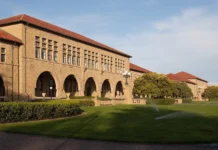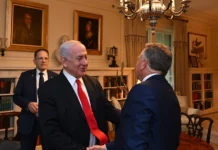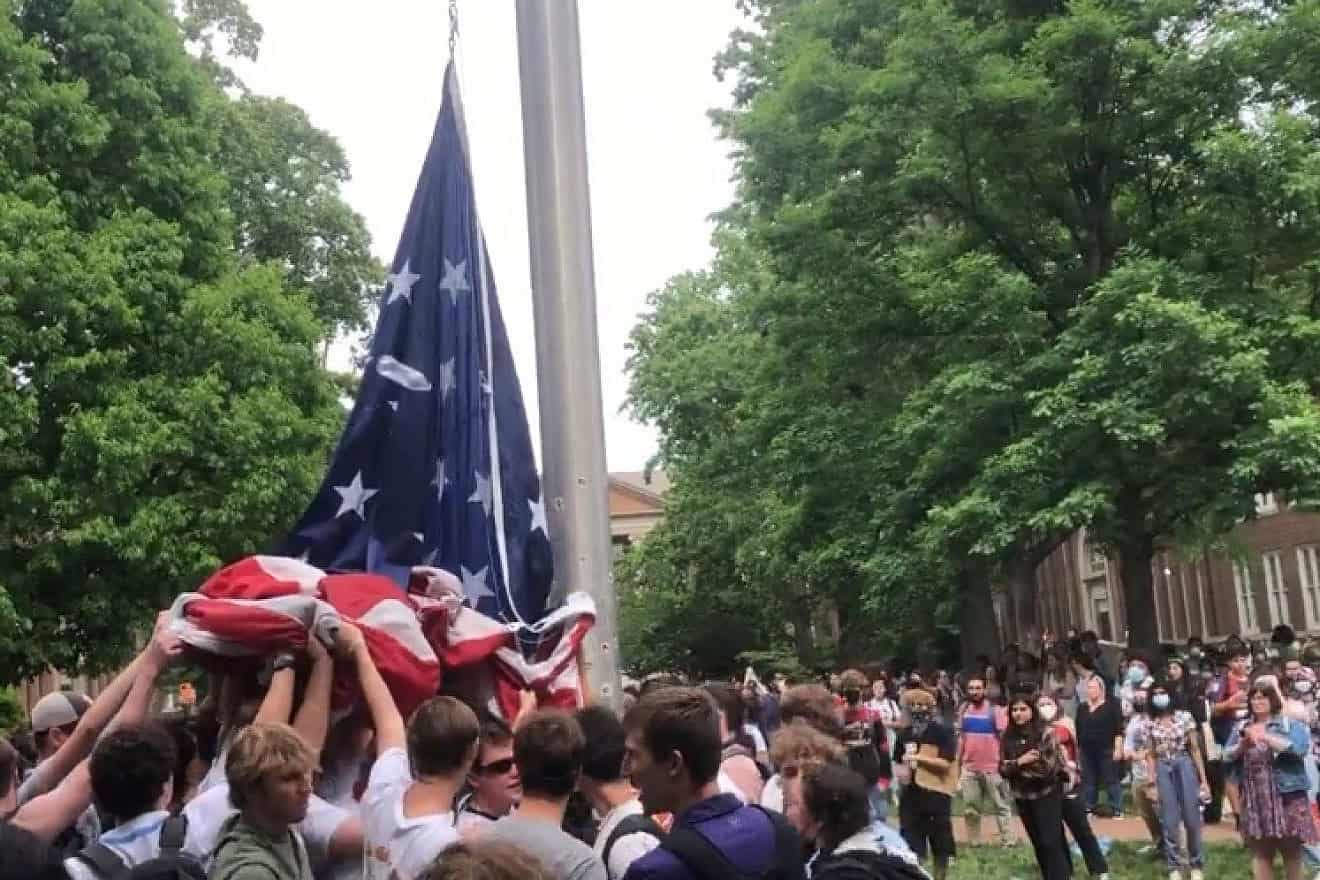When anti-Israel protesters at the University of North Carolina at Chapel Hill hurled slurs and objects at Jewish students, it drew little attention.
Late last month, when those same protesters ripped down the American flag in the center of the public school’s campus and replaced it with a PLO one, it seemingly served as a wakeup call to patriotic students that the ideological battle being waged on campus stretched far outside the confines of the Israel-Hamas conflict.
“They’re basically saying, ‘If you’re not with us, you’re against us.’ That’s the message you’re sending when you’re taking down the American flag, because no matter what, we’re supposed to be united under that flag,” Brendan Rosenbaum, a political science junior from Rockland County, N.Y., told JNS.
“They’re sending a message to people that weren’t involved at all [in the protests], who just care about America, of who these people were, and what they want to accomplish,” said Rosenbaum. “It wasn’t just about the Palestinians. It was about their whole agenda, their whole ideology.”
Rosenbaum was one of an estimated 12-20 Jewish UNC students pictured in widely-circulated images helping to protect the American flag when Hamas supporters attempted to rip it down from its posting, even after the university’s interim chancellor, Lee Roberts, had ordered its restoration on the pole on the campus’ main quad.
Rosenbaum said many of the Jewish students there that day were from his UNC chapter of Alpha Epsilon Pi, the Jewish fraternity. He said he is also involved with other Jewish organizations on campus, including Chabad and Hillel, and attends events put together by the student-run Heels for Israel.
When it became evident that the protestors call not just for death to Israel, but to America as well, there was a silent realization among non-Jewish students there that day that the Jewish and pro-Israel students had been fighting a worthy battle largely on their own, he said.
Rosenbaum said that since the incident and the Jewish students’ involvement in protecting the Stars and Stripes, “there is a lot more sympathy, and I think there’s a lot more understanding” of what Jewish Tar Heels have been going through.
“It’s not just a Jewish issue. These people show that that is an American issue, too,” Rosenbaum told JNS. “And people became more invested. I got so much support, coming from people that I haven’t spoken to or seen in years, or people I just see in the street.”
Rosenbaum said that “to have that as a Jewish student, when sometimes we feel we’re alone on a really big campus, is amazing. It became something really positive from a really negative experience, something I genuinely value.”
Clearly a Jewish presence
Dan Stompel, a political science sophomore from Miami, was also there that day. He told JNS he had organized counter-protests before, and was standing with his friends, absorbing the insults being slung at them by terrorism supporters.
He couldn’t pinpoint an exact number of Jewish students who had arrived, “but there was clearly a Jewish presence there. There wasn’t an organized response, and there never really is on this campus.”
Stompel, who is Jewish but not a member of AEPi, said Jewish organizations on the Chapel Hill campus “haven’t done much. They kind of say, ‘Don’t get involved,’” as an unofficial response to efforts to organize a response to the protests.
He said he is involved in Chabad and Heels For Israel, along with politically conservative organizations on campus.
The incident came some five days after a pro-Hamas encampment began on campus. Rosenbaum said that during that time, it was “tough for different Jewish students to walk by.” Seeing signs in the encampment such as “Resistance is not terrorism” made it difficult to “function like a normal student,” he added.
When the university ordered the encampment to be taken down, Rosenbaum said he felt he could focus on class again.
That only lasted until the next day, when he and others heard of another pro-Hamas protest set to take place.
“Me and a couple of people in a small group chat decided to show up, and then one of my friends who was part of my fraternity who never comes to any of the protests just had enough, and he showed up,” said Rosenbaum. “I had an Israeli flag. So I asked him if he wanted to hold the flag together.”
For some 90 minutes, he and his friend were screamed at and told “that we should die, and that we should go kill ourselves,” Rosenbaum said.
After the protest moved to the center of campus and the PLO flag was raised in place of the American banner, “it was honestly just a crazy sight. And as soon as that happened, one of the people in my fraternity ran back to the house and actually grabbed an American flag. And then from that point on, it became an Israel and American issue,” he said.
After the American flag had been restored by university administration, only to be taken down again by Hamas supporters, “that’s when me and my friends moved in, surrounded the flag and made sure that the protesters didn’t take it,” Rosenbaum said.
Full water bottles were thrown at him and his friends, opening up a cut on one of their faces, he said.
“At one point, they tried to take fences and block us in, so they could surround us and basically scream at us. I had to take the gates down and sit on them,” said Rosenbaum. “But it was important for us to stand there and show that our beliefs matter no matter what and that we weren’t going to back down.”
























